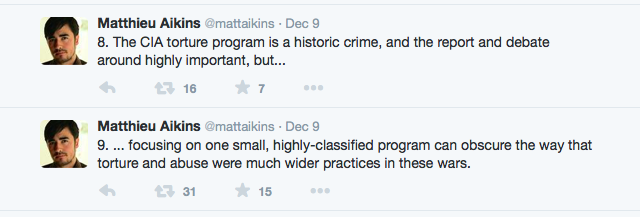The Intercept
Dec. 16, 2014
Have you heard the screams of a prisoner who is being tortured in America’s war on terror? I can’t forget them.
They pierced the walls of a detention center I visited in Samarra during an offensive by American and Iraqi forces in 2005. In a small room, I was interviewing a frightened detainee whose head was bandaged from an injury he unconvincingly attributed to a car accident during his capture. Bloodstains dripped down the side of a desk, and there was an American military adviser with us, as well as a portly officer of Iraq’s special police commandos.
Suddenly there was a chilling scream.
“Allah,” someone wailed. “Allah! Allah!”
As I wrote at the time, this wasn’t a cry of religious ecstasy. It was the sound of deep pain, coming from elsewhere in the town library, which had been turned into a detention center by Iraqi security forces who were advised by American soldiers and contractors. I was embedded with the Americans for a week, and I had already heard two of them, from the Wisconsin National Guard, talk about seeing their Iraqi partners trussing up prisoners like animals at a slaughter. During raids, I had seen these Iraqis beat their detainees — muggings as a form of questioning — while their American advisers watched.
The CIA’s violations of its detainees are the tip of the torture iceberg. We run the risk, in the necessary debate sparked by the Senate’s release of 500 pages on CIA interrogation abuses, of focusing too narrowly on what happened to 119 detainees held at the agency’s black sites from 2002-2006. The problem of American torture — how much occurred, what impact it had, who bears responsibility — is much larger. Across Iraq and Afghanistan, American soldiers and the indigenous forces they fought alongside committed a large number of abuses against a considerable number of people. It didn’t begin at Abu Ghraib and it didn’t end there. The evidence, which has emerged in a drip-drip way over the years, is abundant though less dramatic than the aforementioned 500-page executive summary of the Senate’s still-classified report on the CIA.
Matt Aikins, whose reporting on human-rights abuses in Afghanistan has been path-breaking, made this point the other day in a series of concise tweets:

Just as the CIA opposed release of the Senate torture report, the Pentagon and White House continue to do their best to suppress the evidence. The Daily Beast noted the other day that the Obama Administration, responding to pressure from the Pentagon, continues to fight in court to prevent the publication of thousands of photos of detainee abuse. The argument against release is nearly identical to the argument used by the CIA to repress the Senate’s report—it could put American lives in danger. To her credit, Sen. Dianne Feinstein pushed back and published an executive summary of her committee’s 6,000-page report (which has caused practically no protest or violence overseas).
Repression is the gut instinct of institutions that have something to hide, and I came across that in Samarra, too. Shortly after I witnessed the threatened execution of a detainee (an Iraqi soldier pointed his AK-47 at a prisoner who was against a wall with his hands up), an order came down from the American command to get me out of Samarra. I was told to pack my backpack for the next convoy out of town. After I made a flurry of calls on my satellite phone, the order was rescinded. Someone wanted the truth to come out.

